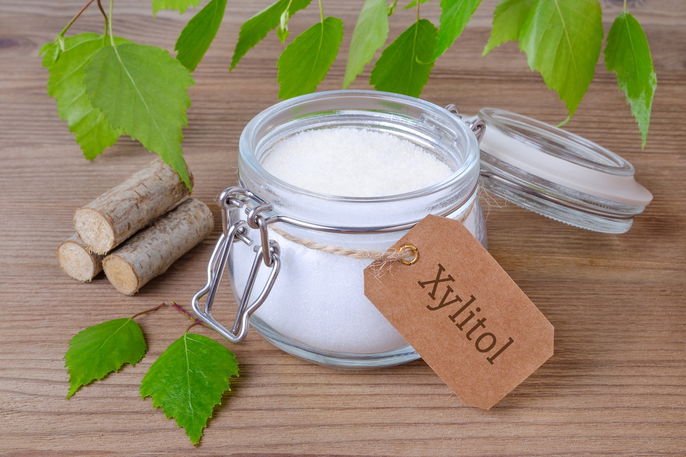Xylitol is a type of natural sweetener that is extracted from foods like plums, strawberries and pumpkin. Because it inhibits the bacteria that cause cavities, it is often used to sweeten chewing gum, mouth wash, syrups and dental creams.
Xylitol is also low in calories and has a low glycemic index, making it a great natural option to help manage glucose levels and promote weight loss.
Also recommended: 20 Low Glycemic Foods (& 3-Day Meal Plan for Low GI Diet) tuasaude.com/en/low-glycemic-foodsXylitol can be found in granulated form at pharmacies, natural health stores and grocery stores. It can tolerate high temperatures and has a mild, sweet taste similar to sugar, and can therefore be used to sweeten juice, tea, coffee, cakes and pies.

Is xylitol bad for you?
Xylitol is a sweetener that is generally considered to be safe for use. It can be used by diabetics, pregnant women and breastfeeding women.
Nonetheless, some studies show that using sweeteners can alter taste buds and cause intestinal flora abnormalities, increasing the risk for conditions like obesity or diabetes. However, more studies are needed to confirm the relationship between sweeteners and these health conditions.
However, an even more recent study shows that xylitol can increase the risk for a thrombosis, heart attack or stroke, as elevated xylitol levels in the blood can promote clotting and impact normal blood flow to the heart or brain.
Health benefits
Xylitol can be used to achieve the following health benefits:
1. Promoting weight loss
Because it has a low glycemic index (only 8), xylitol can help to regulate blood sugar levels and help to manage hunger throughout the day. It can prevent the formation of fat cells, which can reduce the risk for weight gain.
One teaspoon of xylitol only has 8 calories, making it a great option to sweeten foods in comparison to higher calorie sweeteners, like honey or sugar.
2. Preventing cavities
Xylitol can help to prevent cavities, as it inhibits the growth of Streptococcus mutans. This is the main bacteria responsible for causing tooth infections.
3. Helping to manage diabetes
Because it has a low glycemic index, xylitol can keep blood sugar levels within normal ranges. This can be beneficial for patients with hyperglycemia and diabetes.
4. Relieving congestion
Xylitol has been used in the making of nasal irrigation solutions to relieve nasal congestion due to its naturally antibacterial and anti-inflammatory properties. It can help to relieve a stuffy nose and irritation within the nostrils.
5. Preventing ear infections
Xylitol can help to prevent ear infections by combating other microorganisms that live in the mouth and the ears, like Candida albicans.
However, more studies are need to prove the benefits of xylitol to treat ear conditions.
Difference between xylitol and stevia
Stevia is a natural sweetener that is extracted from the Stevia Rebaudiana Bertoni plant. It can be found in powder, granulated or liquid form. Stevia can also sweeten food two to three hundred more times than common sugar, and has an additional bitter taste, which can alter the taste of some foods.
Xylitol is obtained from the fruit and vegetable fibers, and is usually available in granulated form. Xylitol has the same sweetness level as sugar and has a mild taste that does not alter the taste of foods when used.
How to use
This sweetener's properties remain intact even at high temperatures, which is why xylitol can be used to sweeten juices, teas, coffee, cookies, cakes or pies.
Although there is no daily limit of xylitoll to use, you should not exceed 60g of xylitol per day.
Can I use xylitol instead of sugar?
It is important to remember that one teaspoon of xylitol contains the same sweetness as one teaspoon of white sugar.
Possible side effects
Excessive xylitol ingestion can lead to excess gas, abdominal bloating and diarrhea in some people.
Therefore, xylitol should be taken as directed by a doctor or registered dietitian, especially in cases of diabetes, hypertension or pregnancy.
Contraindications for use
People with irritable bowel syndrome should use xylitol because is it poorly absorbed in the gut and leads to excessive fermentation by bacteria. This can lead to symptoms like pain, gas and diarrhea.
Also recommended: IBS Symptoms: Top 10 Signs & Symptoms (w/ Online Quiz) tuasaude.com/en/ibs-symptomsChildren should only be introduced to sweeteners after the age of 2, as directed by a pediatrician.
Frequently asked questions
Some common questions about xylitol are:
1. Is xylitol healthy for you?
Yes, xylitol in moderate doses can be a healthy sweetener and is safe for consumption by many, including diabetics, pregnant women or women who are breastfeeding.
2. Is xylitol bad for the liver?
To date, there is no scientific evidence confirming that xylitol is bad for the liver.
3. Can xylitol cause weight gain?
When incorporated into a healthy and active lifestyle, xylitol will not lead to weight gain.






























